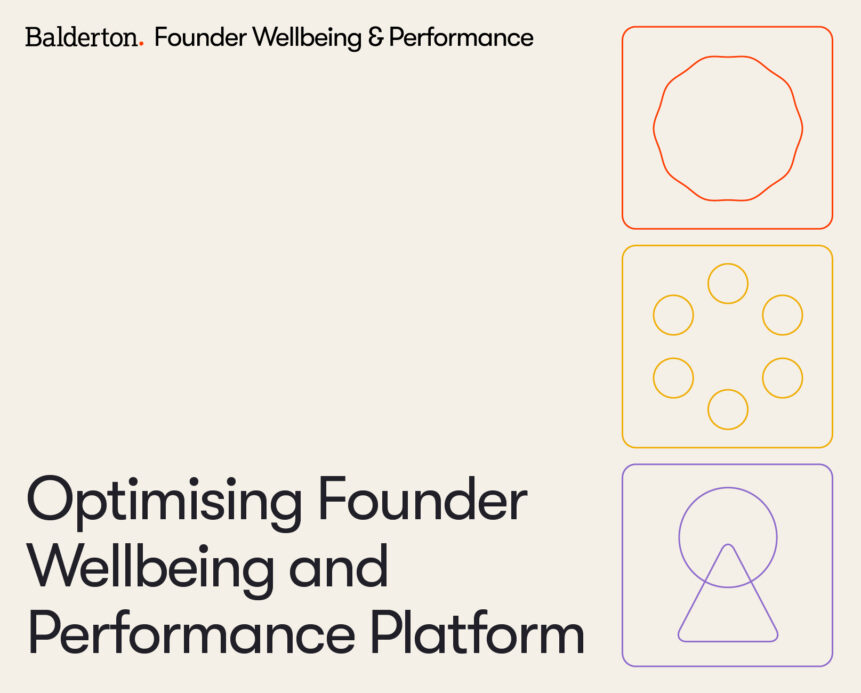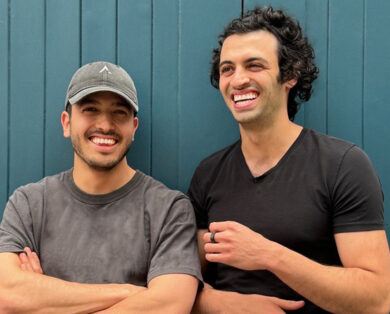- Portfolio News
- 15 July, 2024

Balderton launches Founder Wellbeing Platform to support founders and increase the chances of start-up success.
- 83% of founders feel that, past a point, there are diminishing returns from simply putting in more hours.
- 64% of founders say constant high pressure in entrepreneur-led companies can have a negative impact on business performance.
- 81% of founders feel that VC investors can help create a culture where entrepreneurs can look after their wellbeing, directly impacting performance and increasing the likelihood of success.
Balderton Capital today launches a Founder Wellbeing and Performance Platform, based on research among 230 founders as well as 20 years of experience investing in Europe’s top entrepreneurs.
The research interrogated the inevitable pressures start-up founders are under, and how best to optimise performance in a high pressure environment. The research found that although pressure is unavoidable, putting in ever more hours isn’t always the way to unlock improved performance. Instead, a holistic approach – optimising factors such as sleep, nutrition, as well as personal and psychological support in place – is needed to boost performance.
Furthermore, the research showed a clear role for VCs to offer greater support and resources.
Starting and growing a business is hard, even more so when the economic landscape is uncertain and challenging. However, the historic approach of simply working harder and putting in more hours no longer makes sense. Rather than resulting in more success, Balderton’s research shows that, past a point, this can negatively impact decision making, creativity, and even result in burnout, which is cited as one of the top reasons that startups fail. By changing the dynamic and resetting expectations in the startup ecosystem, we can increase the chances of success, both for the founders and investors
Suranga Chandratillake General Partner, Balderton
Balderton believes that the startup ecosystem can learn from the way professional athletes train and strive for peak performance. They consider a number of factors, including physical health, nutrition, sleep and mental health. And they have a strong network and team of coaches supporting them. This is the structure on which Balderton based its Founder Wellbeing and Performance platform, available to all portfolio company founders. The platform includes:
- Health and fitness programme – led by a team of clinicians, this six-month programme takes a personalised approach to improving physiology, nutrition, fitness, sleep and mindset in order to optimise for performance.
- CEO Forums – peer-to-peer support, bringing together small groups of CEOs in an intimate setting to discuss the personal and professional challenges they face as leaders.
- Executive coaching – our on-staff executive coach is available to support founders and CEOs as they navigate discreet high pressure moments, in addition to our directory of pre-vetted expert coaches who can provide ongoing support.
- Events and resources – our dedicated program of events, webinars, content and resources is designed to empower and educate founders to help them perform at their best.
Founders, like elite athletes, are expected to manage stress and anxiety under pressure, sustain motivation, optimise concentration and communication skills, and contribute to a culture of accountability, while mitigating the risk of burnout, exhaustion and failure. Professional athletes do this by training their brain and central nervous systems to manage stress more effectively, by embracing uncertainty and discomfort, and prioritising self-care, especially when work-life balance feels impossible
Dr Simon Marshall former Professor of performance psychology and resilience, University of California, San Diego
A thriving startup economy brings wider benefits to societies and economies, creating jobs and prosperity across Europe, but Balderton’s research suggests that there is currently a lack of investment in founder wellbeing, which could damage the chances of success in some companies. The stakes are high: in the UK alone, the tech ecosystem is valued at more than $1tn, with nearly 5 million people working in start-ups and scale-ups.
Investors have huge expectations of this generation of tech founders and more than ever we need innovative technology to solve some of the world’s biggest problems. However, there is a clear disconnect between what founders know helps them to produce the best results and what happens in practice. Frankly, when founders can not perform well their whole company suffers. This is why Balderton is taking steps to ensure every founder is supported and helped to grow both as a leader of their team and as a successful company builder. We think that is the way to achieve success as we invest for the future, building the European tech companies that will make an impact on global markets.
Bernard Liautaud Managing Partner, Balderton
Key findings from the research show:
Founders consider the startup ecosystem to be a high-pressure environment, exacerbated by the current economic climate.
- 89% of founders surveyed felt that the startup ecosystem was a naturally competitive and high pressure environment.
- 82% believe that working long hours is an inevitable part of being an entrepreneur.
- 71% say that entrepreneurs are expected to constantly prioritise working over investing time in their own wellbeing.
However founders know there are diminishing returns from just ‘working harder’
- 83% of founders feel that, past a point, there are diminishing returns from simply putting in more hours.
- Multiple respondents to the survey reported having become physically and/or mentally ill as a result of sustained stress. Conditions included burnout, depression, anxiety, insomnia, as well as multiple instances of hospitalisation.
The long-hours culture is created by founders themselves, but investor expectations also have a bearing
- 90% of founders agree that the pressure entrepreneurs put on themselves often drives them to constantly work very long hours.
- 57% say they regularly work long hours most or almost all of the time.
- 84% feel there is an expectation that entrepreneurs must always work long hours in order to be successful.
- More than half (51%) of founders say that investors and board members put pressure on entrepreneurs to always be available.
Lack of balance in life + stress + high pressure = negative performance for founder and whole team
- Overwhelmingly, founders agree excessive stress can result in bad decision making (88%).
- Four in five (83%) believe constant high pressure can lead to team burnout, with most (64%) saying it can also negatively impact business performance.
- Founders believe their own poor performance has a knock-on to their wider team.
- 90% say it is their responsibility to set the tone for a company where everyone can look after their wellbeing.
Finding time is key issue stopping founders from looking after themselves – but isolation is also a factor
- 72% say it’s hard to find time to prioritise wellbeing.
- 61% say they find it hard to find support from those who understand the unique challenges they face.
- 81% of founders feel VCs can help create a culture where entrepreneurs can look after their wellbeing, with benefits for their performance and increased success.
Specific examples from some of the founders who completed the survey include:
“I was in the burnout zone most of last year. Mixture of challenging markets and endless investor meetings with bad sleep, bad diet and low exercise. Putting more and more hours in as the solution… It was lose-lose-lose for everyone. It impacted strategic decision-making, team dynamics, morale and performance.“
“I find that when I’m under a lot of pressure, I am terrible at longer term thinking. Setting strategy and direction requires deep thinking, research and creativity. This is vastly reduced under high pressure – your mind is not free to explore when it’s crowded.”
“There was a very noticeable impact on how well we tracked as a company. Spent too long working on the wrong things, we were not agile enough, etc. I was distracted and unable to focus and work effectively on the right things.”
This research has shown that it is in the best interests of VCs and founders to work towards a culture where we think about performance much more holistically. The change required cannot be driven by a single firm or startup, but will require an industry-wide shift in how we think about delivering peak performance, increasing the chance of success for the entire ecosystem.
Note on methodology
Balderton surveyed 230 founders, all of whom were either founders or co-founders of Venture Capital backed companies, between May 10-24 2023. The survey was conducted online. Responses were collected in two main ways:
- Through direct email outreach to Balderton portfolio companies and contacts who qualified for the survey.
- Dissemination of the survey via LinkedIn (all respondents were asked to provide their LinkedIn profile, which was used to ensure they qualified for the survey).
Data was collected and processed by a third party with no personally identifiable information shared with Balderton.
MORE FROM THE FOUNDER AND EXPERT ECOSYSTEM:
Nico Jaspers, founder and CEO of Latana, said: “When I was an athlete, we had to take regular breaks between practice and competitions to be 100% mentally and physically fit when it mattered. But when I founded my own company, I somehow had the feeling that taking breaks was not really an option, and that I had to be there for everything all the time – it was like running a marathon in sprint-mode. As a result, there were periods where I felt completely exhausted and where it was increasingly difficult to be on top of things when it mattered most. Over the past few years I had to re-learn to manage my time and energy more responsibly and it turned out to be relatively small things – like switching off all notifications from my phone, doing sports regularly, taking time off from work and family once in a while – that made a huge difference.”
Rachel Delacour, Cofounder and CEO of Sweep said: “Building a tech startup is a marathon. Every founder should have a safe space – ‘a basecamp’ where they feel well and can bounce back. This is paramount to keep going and face all the ups and downs of the entrepreneurial journey.”
Alex Kendall, Co-founder and CEO, Wayve said: “Building a deep tech company to transform the world takes years. That’s why I believe it is so important to be passionate about the journey, not just the outcome. Not only that, but you have to get thousands of decisions right, day after day, to drive compounding value. I’ve found being deliberate about your well-being is one of the greatest forms of leverage you can have for this as a leader. Since founding Wayve six years ago, I’ve seen many initiatives encourage positive well-being, such as our chef feeding our team to fuel innovation. In this time, some of my best ideas have come while I am climbing mountains and having a supportive group of people around me enables me to make the tough decisions.”
Ute Stephan, Professor of Entrepreneurship, King’s College London, said: “The mental wellbeing of entrepreneurs is a critical but widely overlooked foundation of their success. High mental wellbeing means more productive, creative, and persistent entrepreneurs and more ambitious and resilient businesses. Entrepreneurs whose mental wellbeing suffers make poorer decisions and find it difficult to cope with challenges and crises, leading to unnecessary business churn.”
Alison Pope-Rhodius, PhD, Professor, Director of Applied Sport and Performance Psychology (ASPP), Dominican University of California, said: “High performance can come at a price. If you’re not strategic about it, the cost can be burnout, unhappiness, demotivation, performance diminishments and mental health concerns. It is more challenging to consistently meet or exceed expectations on a regular basis for a long period of time without taking care of the factors that can lead to performance hurdles or even breakdown. By planning for the long game, you and your company can thrive; you can swiftly adapt to the curveballs, the fast-paced needs of the environment and enjoy the ride more.”
Alexandra Durnford, founder of executive coaching firm Byron and Wilf, said:
“Founders have taken on the challenge of founding companies because of their incredible drive. Inevitably, they put themselves under enormous pressure to succeed and to deliver – it is a part of what makes them successful. A key part of my role is to work with founders to make sure that this pressure is productive. Where this pressure is getting in the way of them delivering their best, as a leader, it is about revisiting existing habits and prioritisation, and finding an approach that is genuinely sustainable for them. Good leadership needs to be about delivering in the long term, not driving yourself to burnout.”
Shikha Ahluwalia, Principal at Balderton Capital and former co-founder of Indian e-commerce platform StalkBuyLove, said: “I founded StalkBuyLove at a very young age, and I was not prepared for the serious toll it would take on my mental and physical health. Building a business is always going to be hard, but there are tangible steps we can take to help founders invest in themselves and thus help create superior business outcomes in the long-term.”
Suranga Chandratillake, General Partner at Balderton Capital and a former co-founder and CEO of Nasdaq-listed blinkx, said that he quit his CEO role at 35 because he was burnout after 10 years in the role. “Had I planned my life for a 30 year journey, things might have been quite different. We believe there is a better, smarter way of working – as the elite sports industry and individuals in far-ranging fields, like the performing arts or medicine, have already figured out. We are doing this because we believe that the best way to change the world is to build a business. And that for those companies to change the world, they need leaders who can last as long as their vision.”














